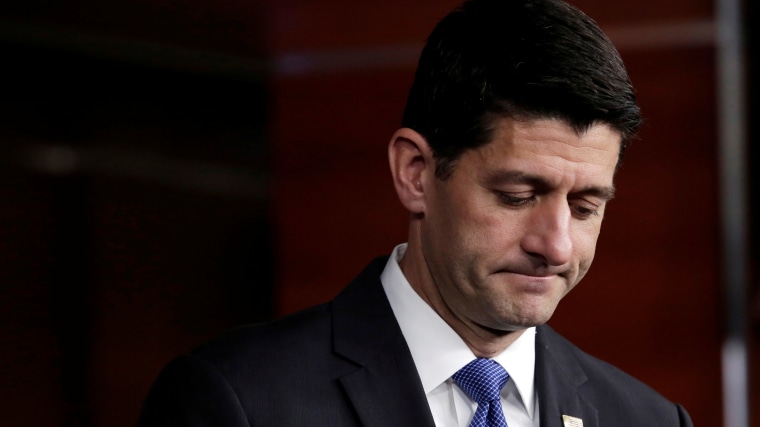House Republican leaders on Monday formally unveiled legislation to repeal most of the Affordable Care Act and "replace" it with a very different health policy scheme ― one in which government would do a lot less to help people get comprehensive health insurance and, most likely, many more people would struggle to find affordable medical care. [...]The plan endorsed by House Speaker Paul Ryan (R-Wis.) ... offers less financial assistance to low-income people, likely resulting in millions of Americans losing the health coverage they have today, and provides tax credits to people with higher incomes. The bill scraps key consumer protections.And, crucially, the legislation is a vehicle for massive tax cuts for rich people and corporations, paid for by slashing assistance to poor and middle-class people.
After seven years of effort, Republicans unveil a woeful health bill
Republican leaders worked in secret for more than seven years on their alternative to "Obamacare." Their efforts produced a genuinely pitiful result.

Congressional Republicans started working on their alternative to the Affordable Care Act in June 2009. That was, for those keeping score, 92 months ago. And over the course of those months, GOP leaders would periodically assure the public that their amazing reform law, written behind closed doors without so much as a hint of transparency or attempts at bipartisan cooperation, was nearly complete.Those promises soon became the punch line to a pitiful joke. Late yesterday afternoon, however, those engaged in the health care debate stopped laughing and started reading -- because the long-awaited Republican version of "Obamacare" was finally unveiled. The Huffington Post's summary is an excellent place to start.
As you read news accounts of the new, 66-page blueprint, you're likely to see reports saying the law is similar to the ACA, which is true in a structural sense. "Obamacare" provides millions of consumers with subsidies to buy private insurance, and the Republican plan -- "Ryancare"? "Trumpcare"? -- does something similar, replacing income-based subsidies with age-based tax credits. It's one reason many on the right are already panning the new bill as "Obamacare Lite."But make no mistake: this approach is a significant departure from the status quo, deliberately shifting resources away from working families and towards the wealthy. The basic outline may look similar to the ACA, but the Republican plan takes "Obamacare," makes it less generous to Americans who need a hand, and strips consumers of valuable protections.House GOP leaders have therefore spent more than seven years coming up with a proposal that will please almost no one and even seems to be lacking a purpose. The goal, obviously, is to scrap the Affordable Care Act, but after reading the Republican alternative, I'm not at all sure on why, exactly, GOP leaders have made this a priority.Vox's Ezra Klein had a good piece on this: "'In general,' writes Peter Suderman, 'it's not clear what problems this particular bill would actually solve.' This is a profound point. It is difficult to say what question, or set of questions, would lead to this bill as an answer. Were voters clamoring for a bill that cut taxes on the rich, raised premiums on the old, and cut subsidies for the poor? Will Americans be happy when 15 million people lose their health insurance and many of those remaining face higher deductibles? ... [T]he biggest problem this bill has is that it's not clear why it exists. What does it make better? What is it even trying to achieve?"Those need not be seen as rhetorical questions. Republicans have complained that the deductibles under the ACA were too high, but their new plan will push them higher. Republicans have said "Obamacare" doesn't cover enough people, but their plan will likely take coverage from millions of Americans.I say "likely" because we don't yet have firm data from the Congressional Budget Office. Indeed, House Speaker Paul Ryan (R-Wis.) and his team have launched their bill in a strikingly half-assed way: Republicans, by their own admission, have no idea how much their bill will cost, no idea how many it will cover, no idea what impact the plan will have on the deficit, and no idea how to pay for the policies once they scrap existing ACA taxes.In a Q&A published last night, House Republican leaders ask and answer a series of common questions. At one point, the document asks, "How are you paying for this plan? How much is it going to cost taxpayers?" In response, GOP officials quite literally wrote, "We are still discussing details."By any fair measure, this is a pitiful plan completed in a cringe-worthy way. Among stakeholders, the "American Health Care Act," as Republicans are calling their plan, will have few, if any, champions, and its provisions contradict practically every promise Donald Trump made to the nation about how the system will look as a result of Republican policymaking.This may help explain why the White House statement in response to the bill's unveiling was, to be charitable, lukewarm, and included no endorsement.There's no shortage of moving parts to this, and I'm obviously just scratching the surface, but the process is set to move forward very quickly. Republican leaders want the first committee vote on this reform plan to be held tomorrow.Buckle up.Postscript: You may have heard that 6 of the bill's 66 pages are devoted to blocking Medicaid payments to lottery winners. As odd as this may sound, that's true, and I have no idea why GOP lawmakers are so concerned about this.